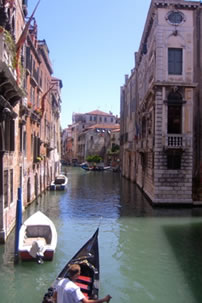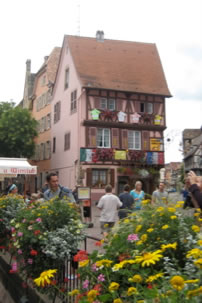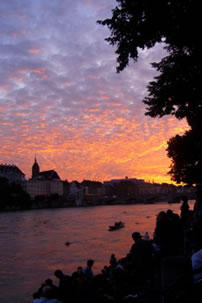Art Travel and Study Program in Europe with RISD
A Glimpse at Some of the Great Art and Architecture
Article and photos by Isabel Eva Bohrer

|

|
|
Venice, Italy.
|
Colmar, Alsace.
|
Reconnecting with Europe
The radiant, neon lights of New York City still flashed in my mind; I almost stood in awe of the tranquility of Lucerne. The serene Swiss town is my birthplace, yet after four years at Columbia University, I am somewhat disconnected from Europe. Thus, I decided to immerse myself in my heritage and take a travel course, “Switzerland + Beyond,” by the Rhode Island School of Design.
What is a Travel Course?
A travel course should be distinct from a conventional study abroad program. Though there are certainly similarities between the two, here are some essential points to consider:
-
A travel course follows a fixed itinerary, while a study abroad program is usually based in one location. Using this location as your base, you can travel to other points of interest, either with the program or on your own.
-
In most cases, travel courses occur outside the fall or spring semesters (i.e., in the summer, during winter sessions, or even during spring break).
-
Not only are travel courses usually shorter than those of the traditional semester, but since you are traveling, you will see selected places on your itinerary.
-
A study abroad semester, in contrast, will offer you a more authentic immersion. This is especially important if you want to learn the local language and/or intern, work, or volunteer abroad.
-
Though they frequently visit local sites, study abroad courses are usually held in a conventional classroom setting, perhaps at local universities. For example, in travel courses, discussions could occur on a bus or as part of a guided city tour.
-
A travel course will likely involve only one professor and a group of students. It is advisable to get to know the professor before signing up for the trip.
-
Some home institutions may offer courses that involve an organized trip to another country, frequently during spring break.
-
Prerequisites for travel courses will vary, just as they do for study abroad. While some courses require a specific language level, others might require a high G.P.A. The RISD course is open to all.
The RISD Travel Course
The course itinerary varies from year to year. Still, in this case, as the title suggests, it is “Switzerland + Beyond.” For us, this meant a round-trip starting in Basel and ending in Zurich. On the way, we traveled to St. Moritz, the Therme Vals, Winterthur, Weil am Rhein (Germany), Colmar (France), and stopped for a day in Venice (Italy). Given that one could spend months studying art and architecture in Venice, the 2-week trip was instead packed and, unfortunately, a bit rushed. Much time was spent on a bus rather than really experiencing cities and the local life.

|

|
|
Fireworks in Basel, Switzerland.
|
Sunset in Basel.
|
Academically, the course was more like a tour than a class. Apart from the final presentation of projects, which involved a travelogue and a T-shirt design, there were no group discussions about the visited sites, and meetings with the professor were limited to two 15-minute conversations on the bus. There is, however, ample room for creativity in the projects, and travelogues can range from annotated Moleskine diaries to online blogs. RISD is known for creativity, after all.
Tips for Travel Switzerland (…and Beyond)
-
Switzerland is very expensive, including fast food chains. Less costly options include preparing food bought at a supermarket, such as Coop, Migros, or Globus. If staying at a hotel with a breakfast buffet, try to make a sandwich to go. Also, if it can wait, consider buying things when you travel to Germany, Italy, or France.
-
Similarly, take advantage of free events. During our trip, we enjoyed spectacular fireworks on Swiss National Day (August 1st) and the Zurich street parade.
-
Tickets for public transportation are included when staying at some hotels. Ask at the reception.
-
Though the course does not focus on language learning, it always helps to know a few phrases. Ask the professor or read the section in your guidebook — just be aware that Swiss German is a dialect different from German!
-
Pack light and in layers. You will be visiting various locations in different countries and at different altitudes. A rain jacket is also always a good idea.
-
You must bring cover-ups to visit churches, particularly in Venice. We did not know this requirement and had to buy paper scarves to wrap around our waists and shoulders.
-
It is also advisable to bring art materials (paints, dyes, glue, etc.) to skip searching for a long time when completing your coursework.
-
However, don’t worry if you haven’t brought everything you could need. You are going to Europe and can purchase it there.
The Bottom Line
If you are looking to go overseas, make sure a travel course is right for you. Get as much information as possible about the course. It is easy to find out how long it is, but how much of that time is spent on a bus or train as opposed to an actual location? If possible, meet the professor to find out who you will be traveling with — and who will assess your work.
Finally, ensure you are not mistaking a short travel course for a study abroad semester. If you have never been to Europe and want your first experience of a foreign culture, the former is your best bet.
Having studied abroad in Madrid for seven months, I am convinced that a semester or even a year abroad is the way to go if you are looking for a more genuine immersion. On the other hand, a travel course is the perfect alternative for exploring a specific field of interest. If the first short visit is successful, you might want to return for a more extended stay.
|
For More Information
Rhode Island School of Design offers various travel courses and European study abroad programs.
Pace University has extensive travel and study abroad course offerings.
Chapman University offers travel courses in 10+ different countries, as well as international internships.
Note: Course offerings are likely to vary from year to year. To learn about up-to-date travel courses, inquire with the school’s international programs office or with specific departments. Anthropology, archeology, and language divisions are often good options. In the ever-globalizing environment, however, almost every department will surely value an experience abroad and perhaps even suggest a way to get there.
|
Isabel Eva Bohrer is the Director and Founder of ROOSTERGNN Global News Network, a non-profit news agency.
|
